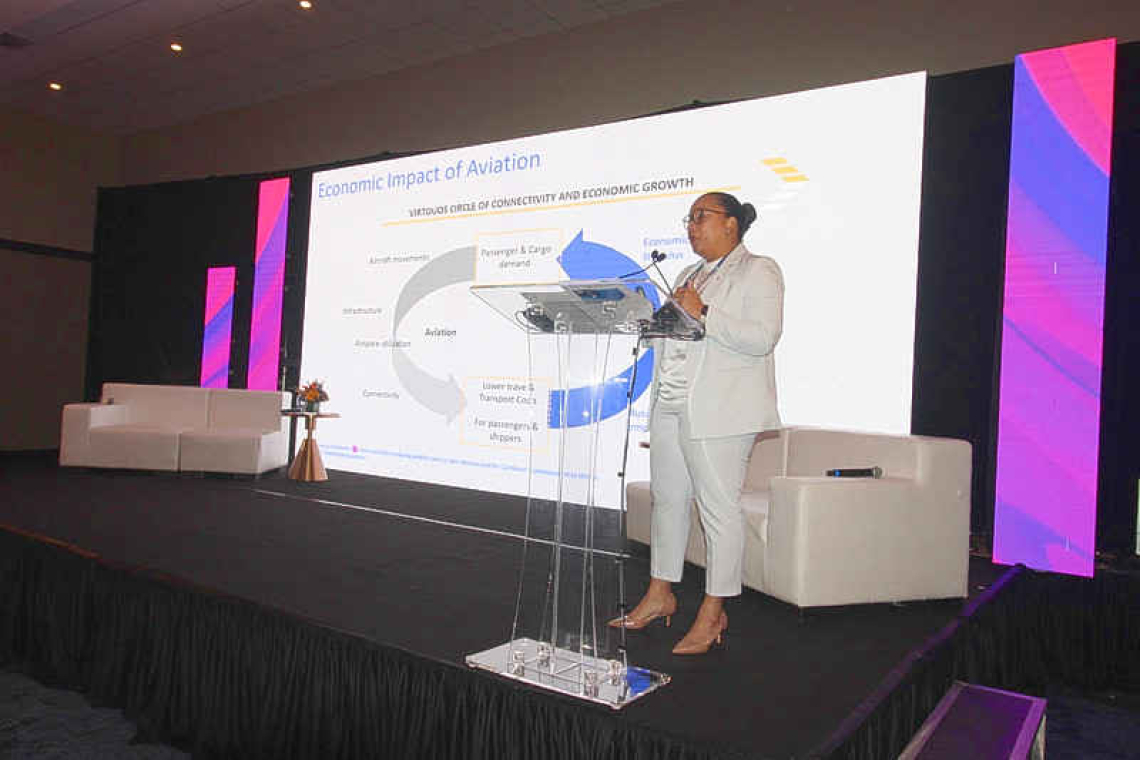Annaleen Lord, Caribbean area manager for IATA, speaking at the DCCA airport conference on Tuesday. (Robert Luckock photo)
MAHO--The Caribbean region’s area manager for International Air Transportation Association (IATA), Annaleen Lord, in her presentation at the Dutch Caribbean Cooperation of Airports (DCCA) conference on Tuesday, said increased tourism taxes are starting to proliferate, exacerbating the already high price of tickets.
She suggested the taxes in some instances are applied “loosely,” and what is done with the tax revenue is questionable in some cases.
“When taxes are not invested in aviation infrastructure, it undermines the industry’s growth and is counter-intuitive to promoting connectivity which is vital for the region’s accessibility and competitiveness,” she explained. “This approach is not sustainable. Taxation must be balanced with maintaining an attractive and competitive tourism market for continued growth and prosperity of the Caribbean aviation sector.”
However, there was some good news from the DCCA conference, as Chairman Jonny Andersen announced some headway in reducing charges for inter-island travel in the Dutch Caribbean.
The phased implementation of reduced Passenger Facility Charges, starting with Curaçao and Bonaire in January 2025 and Aruba in February 2025, marks an important first step in making inter-island travel more affordable and accessible, with the Northeast Caribbean to follow.
Lord was speaking on the subjects of taxation, passenger demand, airport infrastructure, carbon emissions and the impact of climate change. She oversees operations in 29 Caribbean countries.
She said passenger demand in the Caribbean grew faster between 2019 and 2023 than availability of seats.
“This indicates a robust recovery and a desire to travel. Some countries have shown remarkable recovery, surpassing pre-pandemic levels. Dominican Republic, for example, has exceeded 100% of 2019 levels, showcasing the region’s resilience and appeal,” she said. “It underscores the need for adequate infrastructure to meet demand and sustainable growth in the aviation sector.”
In the Dutch Caribbean, Aruba and Curaçao experienced significant growth while St. Maarten and Bonaire have been a little below 2019 levels in recent months. As Lord pointed out, targeted strategies are necessary to boost passenger traffic, as boosting these markets guarantees growth and development of the regional economy.
Despite passenger demand, however, data show a projected downturn in Caribbean tourism compared to the rest of the world. World Travel and Tourism Council (WTTC) data project a decline in Caribbean gross domestic product (GDP) in 2024 compared to regions in Central and South America.
“As a region, 10 years from now Caribbean tourism GDP is not expected to meet or surpass 2019 levels. This again underlines the need for strategic initiatives to revitalise the tourism sector,” she explained.
On airport infrastructure, she said good infrastructure is critical for airlines and their passengers. “It’s not just about capacity but enhancing the passenger experience. By assuring robust infrastructure you facilitate connectivity, access to essential services, and improve quality
of life and prosperity.”
Lastly, on climate change the Economic Commission for Latin America and the Caribbean (ECLAC), composed of 17 countries, warns that if there is no investment in climate change adaptation and mitigation, some 43 million jobs (10% of the labour force) in the agriculture and tourism sectors could be lost by 2050.
Lord said airlines are committed to achieving net zero carbon emissions by 2050. “Developing green technologies in aviation can spur innovation and create new industries. Government policies are also crucial to achieving these goals.”







